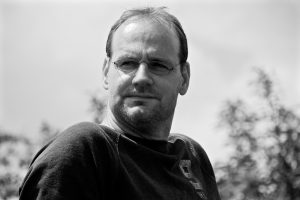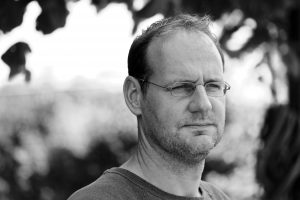'Exciting and accessible, with great tragic content and an unexpected and poignant ending'. With those words, writer Jan Vantoortelboom was awarded the Zeeland Book Prize last week. A Quattro Mani visited him in Zeeuws-Vlaanderen and talked to him about his novel The man who was in a hurry. 'I have grown as a writer.'
Writing House
'The Turtle's Nest' reads the hand-painted sign against the dark stained wooden house in his yard. Next to the door hangs a triangular box with two young lovebirds inside, peering out curiously at each other with their black beady eyes. This 'kot' is the writing home of Jan Vantoortelboom (1975), who is waiting for us in the yard of his house in Zeeuws-Vlaanderen, smiling kindly. In four years, Vantoortelboom wrote three novels. In 2011, he made his debut with the novel The sunken boy (2011), which was awarded the Bronze Owl and the Literature Prize West Flanders 2012. Last year, his second novel reached Master Mitraillette the wider public, when the book was named book of the month on the television programme The World Turned Door.
Here at The Tortelnest, Vantoortelboom, who is also a lecturer at Hogeschool Zeeland, worked on his novel The man who was in a hurry. Matching music at hand, such as that by 2Cellos, two Croatian cello virtuosos who have adapted well-known songs by the likes of AC/DC and Nirvana into new cello versions. 'Before I write intense scenes, I like to listen to that to get in the right mood.'
Poignant scenes plenty in The man who was in a hurry, because it is an intense story about a man, Leon, who, after two tragic events, tries to live outside time, as it were, and keep happiness at bay. As a six-year-old boy, Leon sees his nanny Elsie fall from the attic. She becomes severely disabled in the process and spends the rest of her life as a vegetable in Home Windekind, where Leon visits her every week. A week after his 12th birthday, his mother suddenly dies, and his childhood comes to a definite end. These two events bring Leon's life to a standstill. After high school, he chooses a job as a caretaker over studying, where he opens the gate daily and manages the keys to the classrooms. He spends his life in solitude and silence in a dyke house on the outskirts of his village. Briefly, his inertia seems to be broken by his love for Liliane, but when he frustrates her desire for children, she leaves him. Not much later, Leon makes a profound decision.
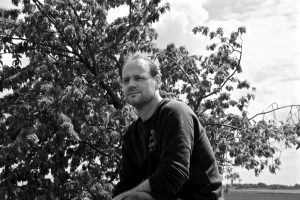
The man who was in a hurry...Whence the title? Leon seems more like someone who prefers to stay still in time.
''That's right, he almost wants to be like Elsie. Although this is not visible to the outside world, inside Leon is very restless, very hurried. Inner turmoil can cause people to have a great zest for life, but others come to a standstill because of it. That's going on with Leon. If life is fun and you're having fun, it goes by faster. Before you know it, you are 20 years on. Leon thinks he will die as young as his mother and sees that end point approaching. By being consciously bored and completely unambitious, he slows down time, so to speak. I recognise that restlessness. The origins of my authorship lie in that feeling of restlessness, and in dissatisfaction.''
What did this discontent consist of?
''My mother died when she was forty-two. I was sixteen. Until then, I lived in a wonderful world, played with friends and there was good food on the table when I came home. After she died, my father was mostly working, my brother was in rooms in Ghent and I was home alone a lot or hanging around on the street.
The illusion of security had shattered. My friends, who hadn't experienced anything yet, went to college and were preoccupied with what all they wanted to do with their lives, with the nice job they were going to get and where they would earn a lot of money. I no longer had that enthusiasm and plans.
If time can be so short, I'm going to do what I love, I thought. Fairly headstrong and stubborn, I went to study literature because I liked to read. Then I reached an impasse, from a kind of fear that I almost never consciously felt, but that was apparently in my body. Professionally, I was just messing around; I was a teacher but got no satisfaction from it, even though in the back of my mind I always had the feeling that I wanted to do something with books. My authorship started from that dissatisfaction. There was a wonderful childhood, there was a breaking point and the kind of man I had become afterwards, a melancholic man. I wanted to sort that out. In a way, my mother's death was the beginning of my authorship.''
Do you think you wouldn't have become a writer if she hadn't died?
''There is a chance that my mother's disease is hereditary, so I have had a sense of urgency since her death. It has made me realise that if life can be so short, what I am doing here must have meaning. I just couldn't imagine working at a company that makes plastic parts for a TV anymore. Many jobs are mostly pastimes that don't touch the essence of things. With writing, I touch the essence of myself, my own feelings and thus something universal. I find that meaningful. I think every writer starts by writing for himself, but it has been an eye-opener for me that what I write can also touch others. I never expected to achieve that.''
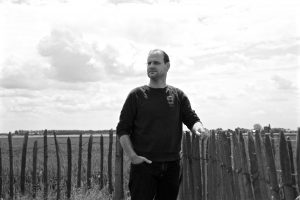
Your three novels show a strong affinity. Invariably, they revolve around an event that causes a rupture in the protagonist's life and, symbolically, casts him out of paradise, while the question is to what extent he is or is not to blame for that event. Leon too feels guilty, or at least responsible for Elsie's situation.
''I have left in the middle whether Leon is at fault. Is it because Leon shouts that she falls backwards or does she fall while he shouts? Whether he is at fault or not, at least he feels guilty.
Because of this event and his mother's death, he loses his innocence. If certain things are not talked about, they can haunt a person for life. From the moment Leon's mother died, not a word about her is spoken. In village communities like Zeeland and West Flanders, that doesn't happen. Never has anyone taken me aside for a moment after my mother's death. My father and aunts never spoke about her again. For me, however, she was always there. Everywhere. In the kitchen cupboard, in the cake, in the books she had read. Her apron hung in the same place for years, behind the door.
Where exactly this guilt-punishment theme comes from, I don't know. Do I feel guilty about my mother's death? No, I don't think so. I have nothing to do with the fact that she got cancer. I suspect it is mainly due to the influence of the Catholic Church, which was still felt in the village where I grew up even in the 1980s. We did not have mixed classes. When the priests came to school, we had to stand straight and bow. Before class we went to church and once every few months we had to make up in the confessional all the things we had done wrong and then obtain absolution.''
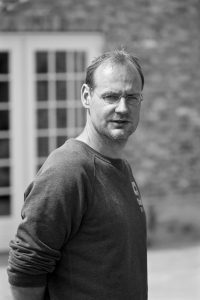
It is striking that your novels have become less and less Flemish, more sober and subdued. The flowery Flemish has given way to subdued, measured sentences with which you draw out your protagonist very precisely.
''I have no desire to shock by writing explicit sex or violence scenes, for instance. My work is subdued and emotionally charged, and with few words you can still achieve a lot of depth, perhaps even more than with sentences full of adverbs and adjectives. With The man who was in a hurry I have grown as a writer, I think. I have learned to match my style to the theme. If I had written in this book as flowery and baroque as my first novel, it would not have suited Leon. I adapted my language and style to Leon's taciturnity and his quiet, stolid surroundings.
The main characters in the first three books are actually Jan Vantoortelboom. Now it's time to come out. I don't want to fall into the pigeonhole that Vantoortelboom always writes about general misery and sorrow. In my next book, I take different paths. There will be a bit more adventure in it, a bit more humour. I want to set up something bigger. More action and reaction. The rough line is already there: it's set in the early 1920s and the main character is a man who takes the Red Star Line from Antwerp to America. He ends up in southern Ireland, at the time when the IRA is rising, and gets involved in a war situation against his will. On the boat, he is mugged. This is a violent scene. When writing such scenes, I listen to rowdy music, Eminem for instance, to evoke the feeling of aggression and rage. I work intuitively. Drift along on a wave and when the water is still again, I stop. It does lead to me living a bit too much in a daze in everyday life, too. I have to watch out for that.''
What is the problem with that?
''My mind is too much elsewhere. Then my children have been calling me for five minutes and I just don't hear anything. I can't. With my first book, it was really problematic. Then I would drive past the school with the children still in the back seat and they would have to pull me by my jacket: dad, school is over there! Or I was at the dentist three hours early. I was obsessively busy with my book. Fortunately, that's better now. When I close the door of my writing house, it is also closed. The rush is gone. Sometimes I still feel: suppose I don't finish it before I die. But even I can come to terms with that. I have published three novels, done what I wanted to do. I have found peace.''
Jan Vantoortelboom - The man who was in a hurry. AtlasContact, € 17.99
